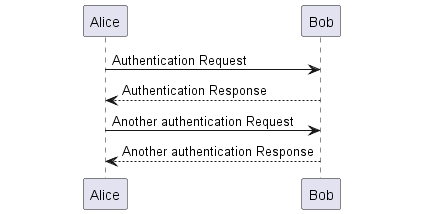Install-Software "PlantUML"
Install the network diagram drawing tool "PlantUML" on Windows.
Introduction
This article explains how to install the network diagram drawing tool PlantUML on Windows. It focuses on setting up the environment to run PlantUML from the CLI (Command Line Interface). It does not cover using PlantUML as a VS Code extension.
Prerequisites
- ✓ Install PowerShell
- ✓ Install WinGet
- ✓ Install Graphviz
- ✓ Verified environment details can be found here
Installation
This section outlines how to install PlantUML . The goal is to prepare an environment where you can run the following command:
java -jar plantuml.jar -verbose sequenceDiagram.txt
Follow these steps to set up the environment:
- Install Java 8 (JRE8: Oracle.JavaRuntimeEnvironment)
- Install Graphviz
- Download the
plantuml.jarfile
1. Install Java 8 (JRE 8)
Launch PowerShell with administrator privileges:
- Open the START MENU and type
pwsh - Click “Run as administrator”
Check the latest available version:
winget search --id Oracle.JavaRuntimeEnvironment -e
Name Id Version Source
------- ------------------------------ ------------ -------
Java 8 Oracle.JavaRuntimeEnvironment 8.0.4510.10 winget
To install, use the verified ID and Source as shown below:
winget install --id Oracle.JavaRuntimeEnvironment --source winget -e
Add the following path to your system environment variables PATH (note: the directory name will vary depending on the version you installed):
"C:\Program Files\Java\jre1.8.0_451\bin"
To verify the installation, close PowerShell and reopen it with administrator privileges. Run the command below to confirm the path is correctly set:
java -version
Example output:
java version "1.8.0_451"
Java(TM) SE Runtime Environment (build 1.8.0_451-b10)
Java HotSpot(TM) 64-Bit Server VM (build 25.451-b10, mixed mode)
2. Install Graphviz
Follow the guide below to install Graphviz
and add its executable path to your system environment variable PATH:
- See > Installing Graphviz
3. Download the plantuml.jar File
Download the plantuml.jar file from the following site (SourceForge
):
By default, the file will be saved to your “Downloads” folder:
Get-ChildItem -Path ~/Downloads/plantuml/
Directory: C:\Users\WDAGUtilityAccount\Downloads\plantuml
Mode LastWriteTime Length Name
---- ------------- ------ ----
-a--- 3/17/2025 9:46 PM 11196866 plantuml.jar
Move the plantuml.jar file to a preferred location. For example, you can create a bin/plantuml directory in your home folder and move it there:
New-Item -Path ~/bin/plantuml -ItemType Directory
Copy-Item -Path ~/Downloads/plantuml/plantuml.jar -Destination ~/bin/plantuml/
Unblock-File -Path ~/bin/plantuml/plantuml.jar
Remove-Item -Path ~/Downloads/plantuml -Recurse -Force
# test path
Get-Item -Path ~/bin/plantuml/plantuml.jar
Directory: C:\Users\<username>\bin\plantuml
Mode LastWriteTime Length Name
---- ------------- ------ ----
-a--- 3/17/2025 9:46 PM 11196866 plantuml.jar
Installation complete.
Sample Code
Let’s generate and visualize a basic sequence diagram.
1. Create a PlantUML-format Text File
First, create a PlantUML-format text file named sequenceDiagram.txt:
@startuml
Alice -> Bob: Authentication Request
Bob --> Alice: Authentication Response
Alice -> Bob: Another authentication Request
Alice <-- Bob: Another authentication Response
@enduml
This file defines a simple sequence diagram.
2. Generate the Diagram Using the java Command
Next, generate the diagram using the java command.
Navigate to the folder containing your text file and run the command below:
# change directory
Set-Location -Path path/to/the/sequenceDiagram.txt
# execute plantuml command
java -jar C:\Users\<username>\bin\plantuml\plantuml.jar -verbose sequenceDiagram.txt
## Replace <username> with your actual Windows username.
## Press <TAB> after typing ~/bin/plantuml/plantuml.jar for autocompletion
This command takes sequenceDiagram.txt as input and generates a PNG image file (sequenceDiagram.png). The -verbose flag outputs logs. If the image isn’t generated, check the logs for issues.
3. Check the Generated Diagram
After executing the command, open the sequenceDiagram.png file and confirm that the diagram was created correctly:
Get-Item -Path sequenceDiagram.png
Directory: C:\Users\WDAGUtilityAccount
Mode LastWriteTime Length Name
---- ------------- ------ ----
-a--- 4/20/2025 8:08 PM 1861 sequenceDiagram.png
Invoke-Item -Path sequenceDiagram.png

Terms
- Graph (Network Diagram)
-
A “graph” here refers to a relationship diagram that connects “nodes” using “arrows” or “lines.” It is distinct from charts like bar graphs or line charts.
- PlantUML
-
An open-source graph visualization tool. Like Graphviz , it uses a text-based syntax to define diagrams. The key differences lie in the syntax and the variety of diagrams supported. PlantUML supports more types of diagrams than Graphviz .
